Millions in Funding from the EU Strengthen Research in Saxony
State Minister Dr. Eva-Maria Stange visited Chemnitz University of Technology and took stock of the 2014-2020 ESF/ERDF funding – Uni presented application-oriented and EU-funded research projects
-
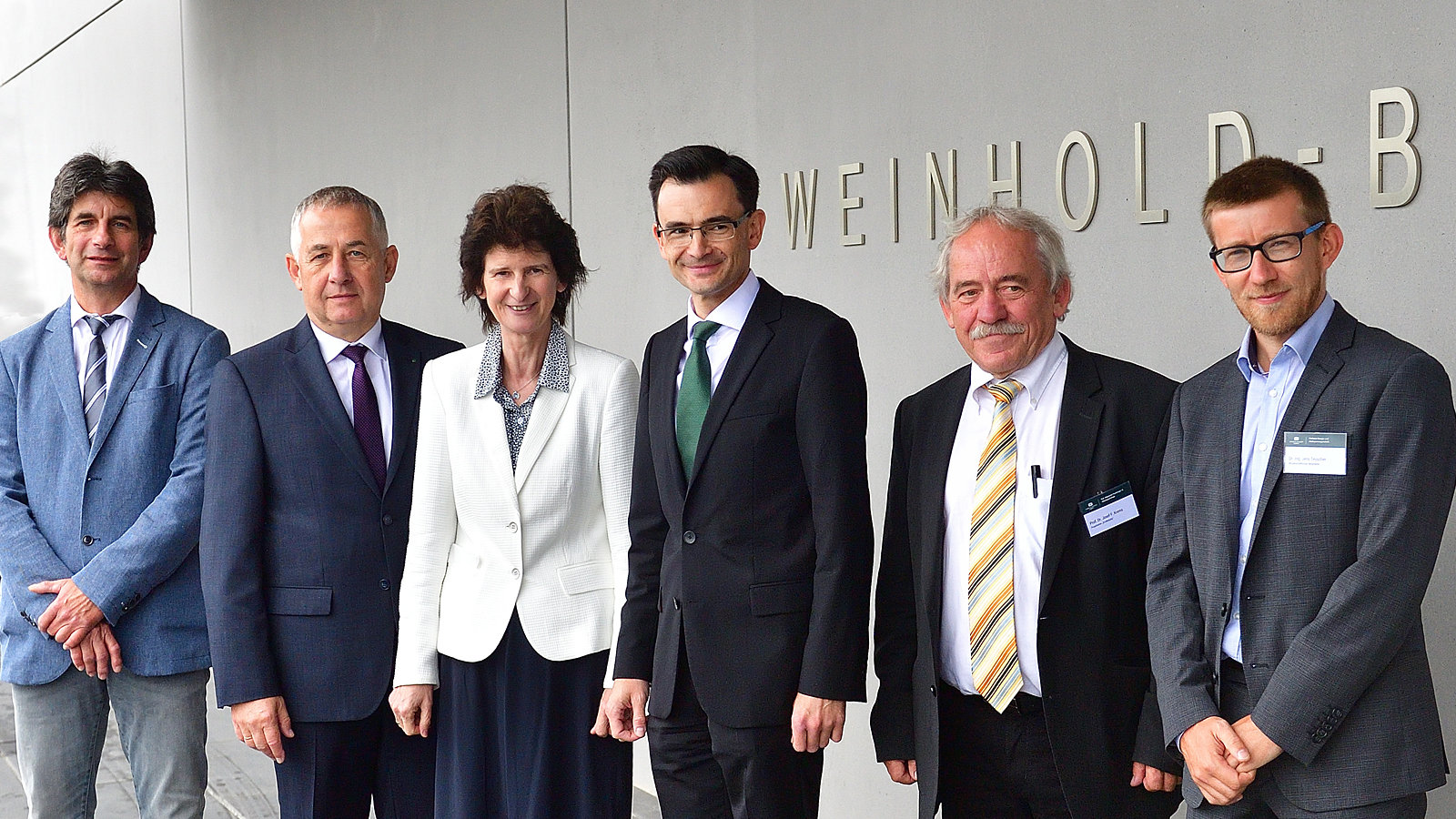
Saxony’s Minister of Higher Education, Research and the Arts, Dr. Eva-Maria Stange, visited Chemnitz University on July 12, 2018 and presented summary information about EU funding from the 2014-2020 ESF/ERDF cycle. Chemnitz University President, Prof. Dr. Gerd Strohmeier (middle), welcomed the Minister and explained the funding’s impact at the university. Two ESF-funded research groups and their directors, Prof. Dr. Gangolf Hirtz (left; "AssiSt") and Prof. Dr. Josef Krems (second from right) and Dr. Jens Teuscher (right; both of ECoMobility) presented highlights from their application-oriented research. Prof. Dr.-Ing. Matthias Putz, Director of the Fraunhofer Institute IWU, presented selected EU-funded research projects conducted outside of the university setting. Photo: Chemnitz University/Wolfgang Schmidt -
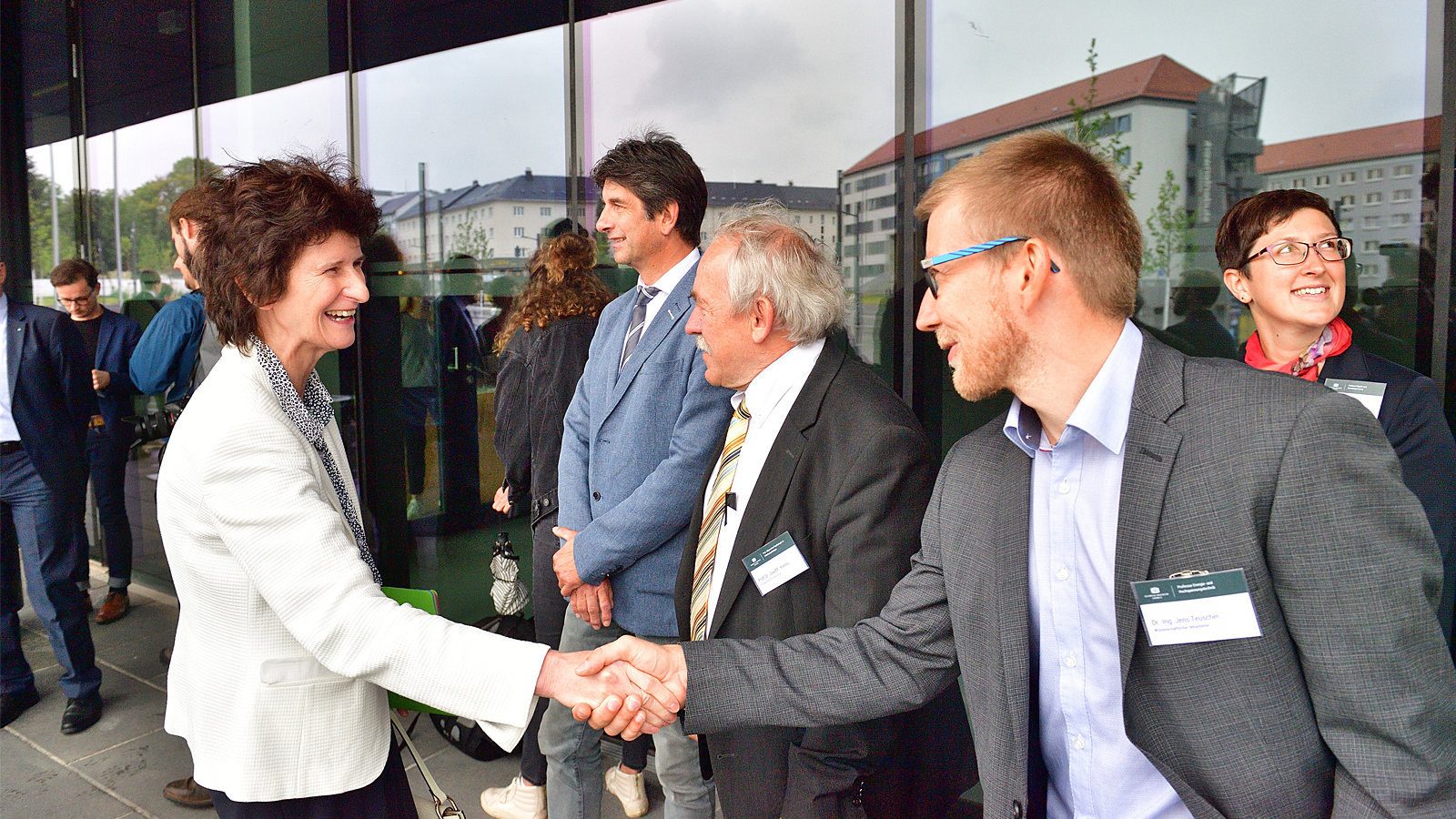
Along with University President Prof. Strohmeier, members of the “AssiSt” and “ECoMobility” junior research groups also met with the Minister. Seen here is the Commissioner of the University Management for Junior Researchers, Dr. Jens Teuscher. Photo: Chemnitz University/Wolfgang Schmidt -
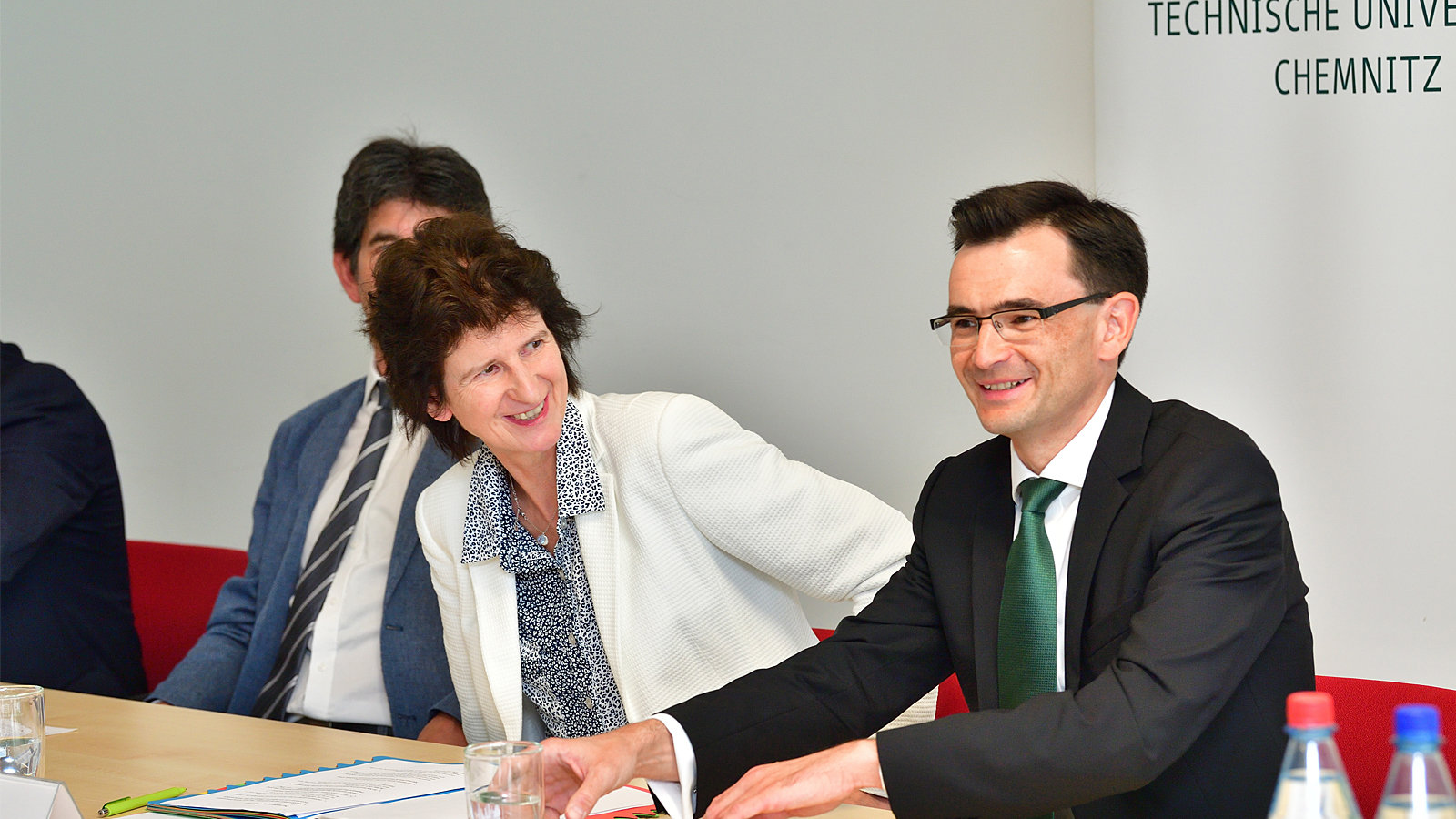
University President Prof. Strohmeier presents performance indicators of ESF and ERDF funding at Chemnitz University to the Minister and the public. Highlights since 2014: approximately 13 million euros for 11 ESF-funded junior research groups and approximately 16 million euros for 30 ERDF research projects. Moreover, the Weinhold-Bau will be completely renovated using 44 million euros of ERDF funding. Photo: Chemnitz University/Wolfgang Schmidt -
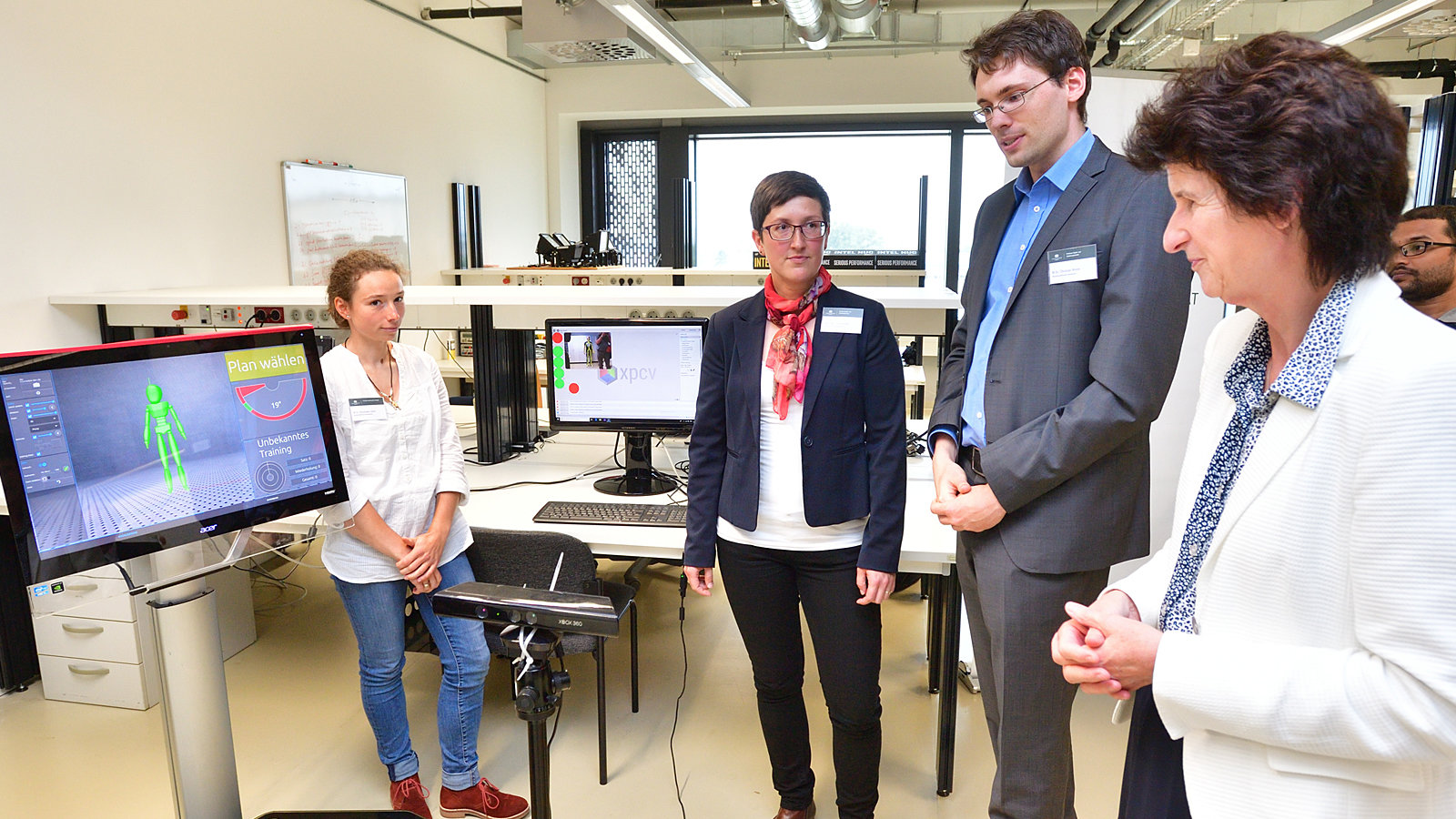
State Minister Dr. Eva-Maria Stange learned more about two ESF junior research groups. The goal of the AssiSt program is to develop a technical assistance system to support patients in medical training therapy programs. Photo: Chemnitz University/Wolfgang Schmidt -
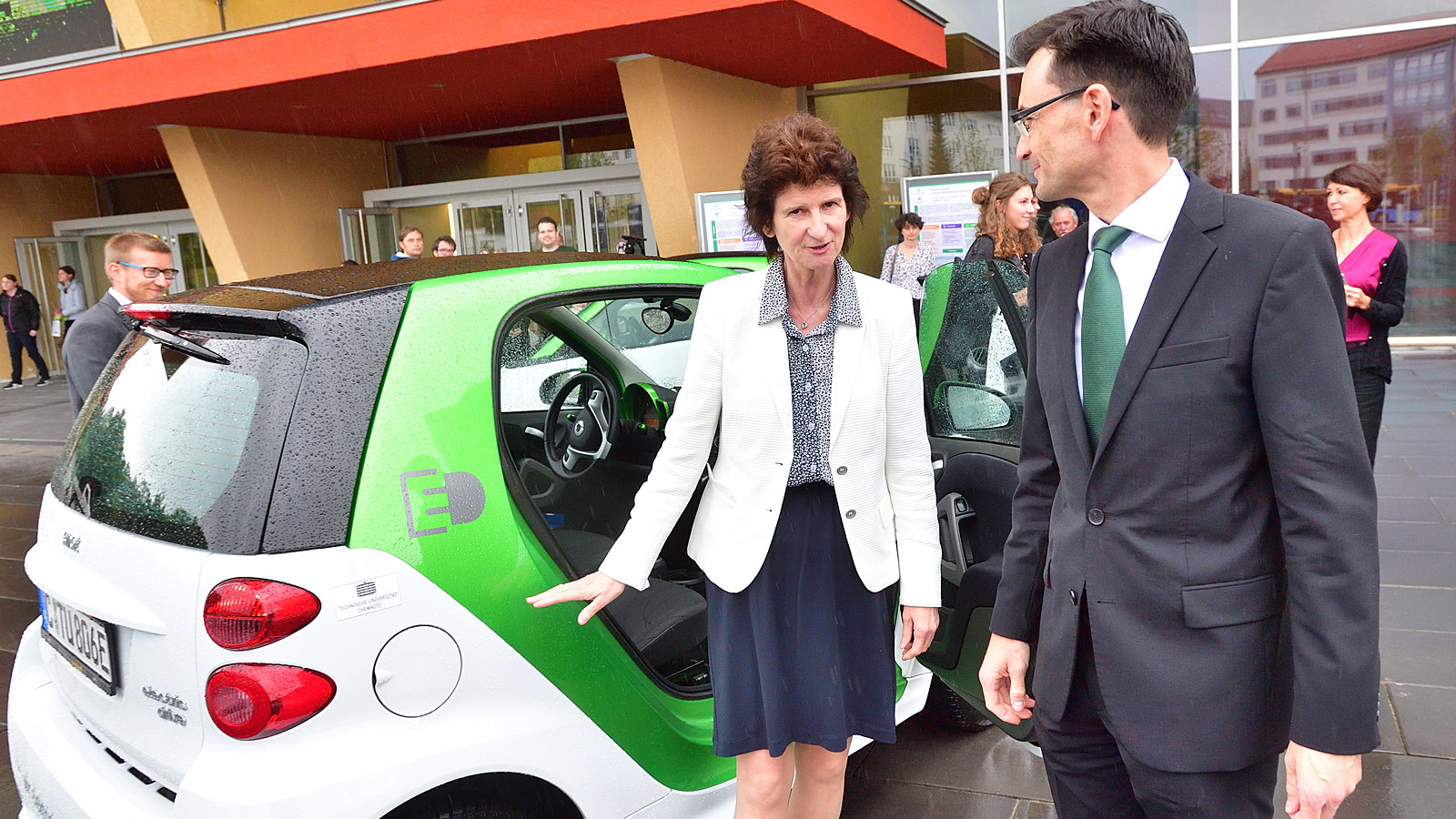
During her visit to the university, Dr. Eva-Maria Stange also learned about the “Connected E-Mobility (ECoMobility)” ESF project. This project is focused on topics like networking electric cars, e-bikes and public transportation to form a sustainable mobility sharing concept. Photo: Chemnitz University/Wolfgang Schmidt
(The following report is a shorter version of the original report in german)
At a July 12, 2008 press conference at Chemnitz University of Technology focused on the use of EU funding in the research domain, Dr. Eva-Maria Stange, Saxony’s Minister of Higher Education, Research and the Arts, emphasized: “If our higher education institutions and research institutes want to remain competitive at the highest level, they need to constantly renovate and renew their facilities and infrastructure. With help from EU funding, we are able to successfully keep Saxony’s scientific sector operating at the most modern level and we are able to support young researchers as they begin their careers. Therefore, this funding from the EU for use in Saxony is money well spent. With these millions of euros of support and the superior infrastructure they will help to establish and maintain, Saxony is highly competitive Germany-wide and indeed globally in certain key domains.”
Prof. Dr. Gerd Strohmeier, President of Chemnitz University:
“Chemnitz University is a research-intensive university that receives a great amount of third party funding. A university that has earned recognition through various lighthouse projects, boasts a Leibniz Prize recipient and occupies multiple top-10 positions in the DFG Funding Atlas. Moreover, the university is extraordinarily successful in the acquisition of third party funding. Funding from the European Union constitutes a significant proportion of this revenue, including from the ERDF and ESF. Since 2014, 11 ESF junior research groups have received around 13 million euros of financial support and 33 ERDF research projects have received around 16 million.”
Background: The AssiSt Project
Project duration: September 2015 through August 2018
Funding amount: approximately €1.3 million
In the AssiSt project, junior researchers are developing a technical assistance system to support patients in medical training therapy programs. The low ratio of therapists to patients, sometimes with as many as fifteen patients assigned to a single therapist, demonstrates the necessity for such an assistance system. The goal is to simulate a therapist’s “eye” using optic sensors and to allow for individualized motion classification. If a patient incorrectly executes a training exercise, the system can notify them in real-time. This will enable the patient to correct their technique to avoid perpetuating incorrect movement patterns.
More information: mytuc.org/grpp (in German)
Press release “A digital Co-Therapist”: https://www.tu-chemnitz.de/tu/pressestelle/aktuell/8389/en
For additional information please contact: Prof. Dr. Gangolf Hirtz, Tel.: +49 371/531-37378, E-mail: g.hirtz@etit.tu-chemnitz.de
Background: The Connected E-Mobility (ECoMobility) Project
Project duration: September 2015 through August 2018
Funding amount: approximately €1.4 million
The ECoMobility junior researcher group studies the networking of multimodal forms of transportation for use as part of an internal mobility concept.
The group is also studying the practical implementation of a sustainable mobility concept for short and mid-range routes using the Chemnitz University setting as an example. Along with technological aspects, the project also focuses on user behavior.
More information: mytuc.org/kygp
Press release “TU Chemnitz baut nachhaltige Vernetzung der Universitätsteile aus”: mytuc.org/lndb (in German)
For additional information please contact: Prof. Dr. Josef Krems, Tel.: +49 371/531-36421, E-mail: josef.krems@psychologie.tu-chemnitz.de
Current Research Results (Selected)
Focus: E-Connected
As part of the E-Connected focus, a web app was developed to reserve and book vehicles and public transportation, data was analyzed and electric cars’ trip data were classified.
Focus: ECological
Charge level estimates, charging control and charging stations are the main elements of ECological. Algorithms for charging control were developed, which enable the simulation of vehicle charging behavior.
Focus: ECo-type adaptive
Using a multi-stage user survey, the most promising business models were determined. The models for mobility and charging offers were evaluated and rated according to cost/benefit, partner, value creation, customer and financial dimensions.
In addition, the Economic focus includes ratings for the use of renewable energies. The evaluation of the energy storage system was of particular importance.
An instagram story about the Minister’s visit is available on Chemnitz University’s Instagram account: https://bit.ly/2Jgtg02
(Translation: Sarah Wilson)
Matthias Fejes
18.07.2018
- Naturwissenschaften
- , Mathematik
- , Maschinenbau
- , Elektrotechnik und Informationstechnik
- , Informatik
- , Wirtschaftswissenschaften
- , Philosophische Fakultät
- , Human- und Sozialwissenschaften
- , Universitätsrechenzentrum
- , Universitätsbibliothek
- , Zentrum für Lehrkräftebildung und Bildungsforschung
- , Studierende
- , International
- , Forschung
- , Wirtschaft
- , Chemnitz




